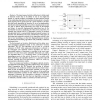19 search results - page 3 / 4 » Using the Central Limit Theorem for Belief Network Learning |
WOWMOM
2005
ACM
13 years 11 months ago
2005
ACM
Ad hoc networks represent a key factor in the evolution of wireless communications. These networks typically consist of equal nodes that communicate without central control, inter...
WWW
2004
ACM
14 years 6 months ago
2004
ACM
In ongoing research, a collaborative peer network application is being proposed to address the scalability limitations of centralized search engines. Here we introduce a local ada...
CORR
2010
Springer
13 years 5 months ago
2010
Springer
Natural networks such as those between humans observed through their interactions or biological networks predicted based on various experimental measurements contain a wealth of i...
INFOCOM
2008
IEEE
13 years 11 months ago
2008
IEEE
—We report that human walks performed in outdoor settings of tens of kilometers resemble a truncated form of Levy walks commonly observed in animals such as monkeys, birds and ja...
INFOCOM
2007
IEEE
13 years 11 months ago
2007
IEEE
— The input-queued switch architecture is widely used in Internet routers due to its ability to run at very high line speeds. A central problem in designing an input-queued switc...

